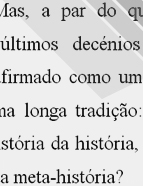

................................
The interest in historical memory—as a memory constructed by historians—persisted, albeit intermittently, and gained traction throughout the 20th century. In 1903, the first specialised history journal, O Arquivo Histórico Português [The Portuguese Historical Archive] was launched. Following the establishment of the First Republic, the Society for Historical Studies (1911) was founded, along with its journal, the Revista de História (1911–28), which established significant connections with other European historiographies. Contributors to this journal included figures such as Benedetto Croce and Edgar Prestage. The relative delay of this associativism among historians, compared to developments in France and Germany, is evident. During this period, the concept of positive or methodical history prevailed, in an environment heavily influenced by nationalist historicism of either liberal or more conservative leanings. The establishment of the First Republic in Portugal was accompanied by political propaganda largely justified through historical arguments. A dominant theory of decline attributed Portugal’s decadence to three centuries of absolute monarchy and Catholicism, shaped by the ideals of the Counter-Reformation and the Inquisition, as well as the negative consequences of overseas expansion. It was argued that this decline had persisted into the 19th century under the Constitutional Monarchy. Republican historicism, centred on a concept of the nation identified with the people, viewed absolute monarchs and the clergy (particularly the Inquisition) as major obstacles to progress. This liberal and republican narrative strategy was challenged by a traditionalist and monarchist generation that emerged around 1914–15, exemplified by the group known as Integralismo Lusitano, deeply influenced by the conservative nationalism of Charles Maurras’s Action Française. In the opinion of these authors, including António Sardinha, the causes of decline were instead rooted in liberalism, f reemasonry (often associated with Iberian tendencies), and religious heterodoxy—including Judaism.
